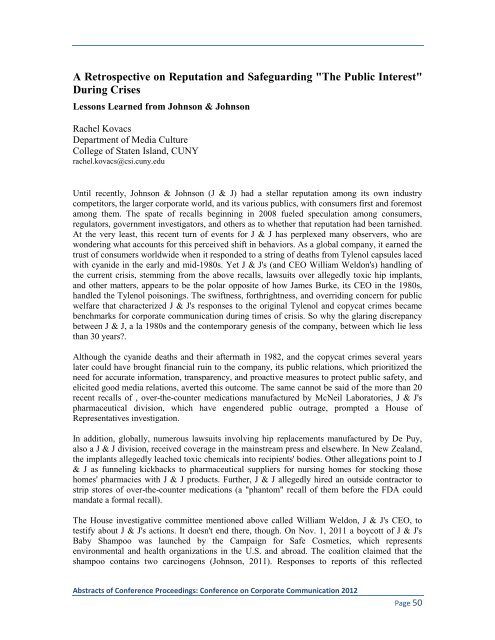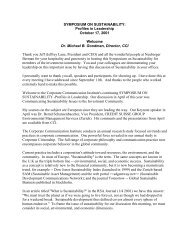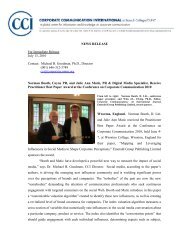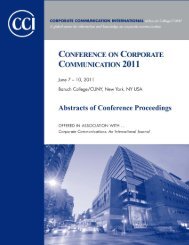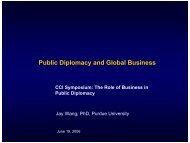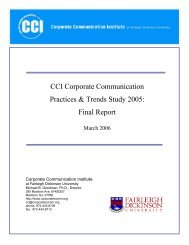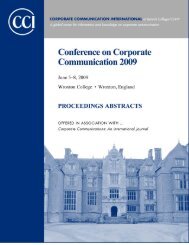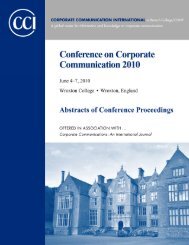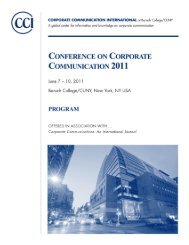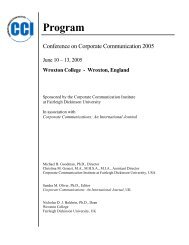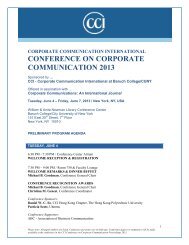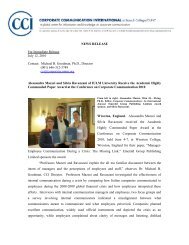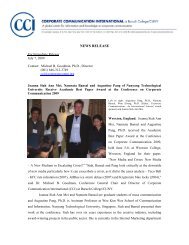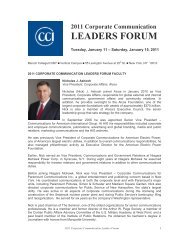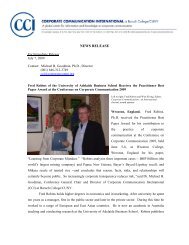Proceedings: Conference on Corporate Communication 2012 Page 1
Proceedings: Conference on Corporate Communication 2012 Page 1
Proceedings: Conference on Corporate Communication 2012 Page 1
You also want an ePaper? Increase the reach of your titles
YUMPU automatically turns print PDFs into web optimized ePapers that Google loves.
A Retrospective <strong>on</strong> Reputati<strong>on</strong> and Safeguarding "The Public Interest"<br />
During Crises<br />
Less<strong>on</strong>s Learned from Johns<strong>on</strong> & Johns<strong>on</strong><br />
Rachel Kovacs<br />
Department of Media Culture<br />
College of Staten Island, CUNY<br />
rachel.kovacs@csi.cuny.edu<br />
Until recently, Johns<strong>on</strong> & Johns<strong>on</strong> (J & J) had a stellar reputati<strong>on</strong> am<strong>on</strong>g its own industry<br />
competitors, the larger corporate world, and its various publics, with c<strong>on</strong>sumers first and foremost<br />
am<strong>on</strong>g them. The spate of recalls beginning in 2008 fueled speculati<strong>on</strong> am<strong>on</strong>g c<strong>on</strong>sumers,<br />
regulators, government investigators, and others as to whether that reputati<strong>on</strong> had been tarnished.<br />
At the very least, this recent turn of events for J & J has perplexed many observers, who are<br />
w<strong>on</strong>dering what accounts for this perceived shift in behaviors. As a global company, it earned the<br />
trust of c<strong>on</strong>sumers worldwide when it resp<strong>on</strong>ded to a string of deaths from Tylenol capsules laced<br />
with cyanide in the early and mid-1980s. Yet J & J's (and CEO William Weld<strong>on</strong>'s) handling of<br />
the current crisis, stemming from the above recalls, lawsuits over allegedly toxic hip implants,<br />
and other matters, appears to be the polar opposite of how James Burke, its CEO in the 1980s,<br />
handled the Tylenol pois<strong>on</strong>ings. The swiftness, forthrightness, and overriding c<strong>on</strong>cern for public<br />
welfare that characterized J & J's resp<strong>on</strong>ses to the original Tylenol and copycat crimes became<br />
benchmarks for corporate communicati<strong>on</strong> during times of crisis. So why the glaring discrepancy<br />
between J & J, a la 1980s and the c<strong>on</strong>temporary genesis of the company, between which lie less<br />
than 30 years?.<br />
Although the cyanide deaths and their aftermath in 1982, and the copycat crimes several years<br />
later could have brought financial ruin to the company, its public relati<strong>on</strong>s, which prioritized the<br />
need for accurate informati<strong>on</strong>, transparency, and proactive measures to protect public safety, and<br />
elicited good media relati<strong>on</strong>s, averted this outcome. The same cannot be said of the more than 20<br />
recent recalls of , over-the-counter medicati<strong>on</strong>s manufactured by McNeil Laboratories, J & J's<br />
pharmaceutical divisi<strong>on</strong>, which have engendered public outrage, prompted a House of<br />
Representatives investigati<strong>on</strong>.<br />
In additi<strong>on</strong>, globally, numerous lawsuits involving hip replacements manufactured by De Puy,<br />
also a J & J divisi<strong>on</strong>, received coverage in the mainstream press and elsewhere. In New Zealand,<br />
the implants allegedly leached toxic chemicals into recipients' bodies. Other allegati<strong>on</strong>s point to J<br />
& J as funneling kickbacks to pharmaceutical suppliers for nursing homes for stocking those<br />
homes' pharmacies with J & J products. Further, J & J allegedly hired an outside c<strong>on</strong>tractor to<br />
strip stores of over-the-counter medicati<strong>on</strong>s (a "phantom" recall of them before the FDA could<br />
mandate a formal recall).<br />
The House investigative committee menti<strong>on</strong>ed above called William Weld<strong>on</strong>, J & J's CEO, to<br />
testify about J & J's acti<strong>on</strong>s. It doesn't end there, though. On Nov. 1, 2011 a boycott of J & J's<br />
Baby Shampoo was launched by the Campaign for Safe Cosmetics, which represents<br />
envir<strong>on</strong>mental and health organizati<strong>on</strong>s in the U.S. and abroad. The coaliti<strong>on</strong> claimed that the<br />
shampoo c<strong>on</strong>tains two carcinogens (Johns<strong>on</strong>, 2011). Resp<strong>on</strong>ses to reports of this reflected<br />
Abstracts of <str<strong>on</strong>g>C<strong>on</strong>ference</str<strong>on</strong>g> <str<strong>on</strong>g>Proceedings</str<strong>on</strong>g>: <str<strong>on</strong>g>C<strong>on</strong>ference</str<strong>on</strong>g> <strong>on</strong> <strong>Corporate</strong> Communicati<strong>on</strong> <strong>2012</strong><br />
<strong>Page</strong> 50


